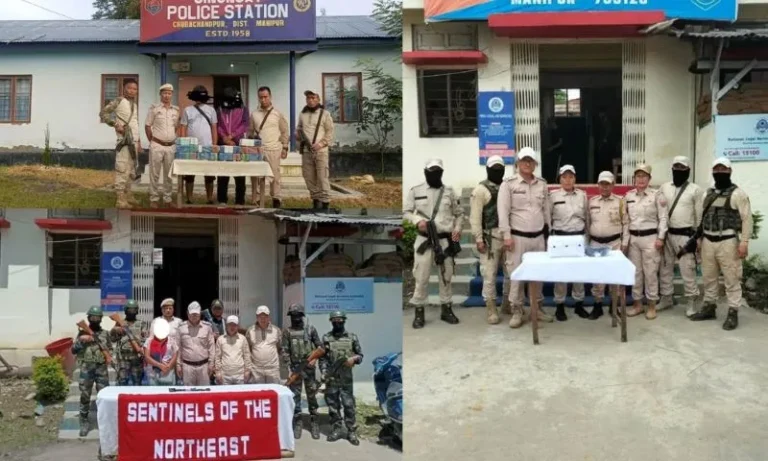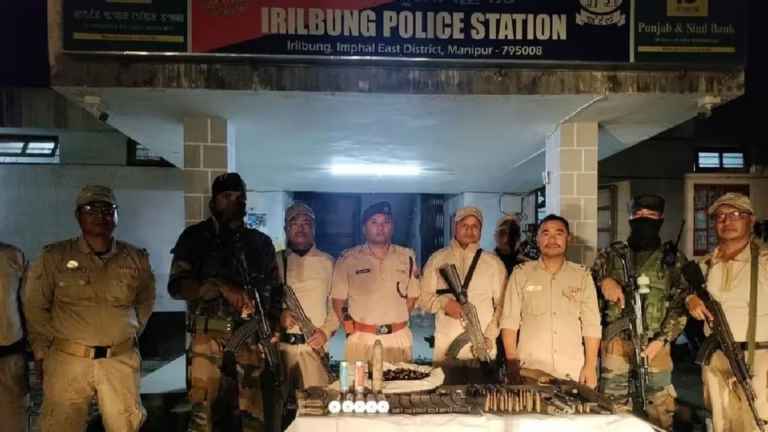Crackdown on Fake Document Racket and Illegal SIM Card Sales in Manipur
News Summary
In recent developments in Manipur, law enforcement authorities have successfully arrested two individuals linked to a fake document racket involved in the sale of illegal SIM cards. The operation, which unfolded over the past few days, uncovered a network that not only issued counterfeit documents but also enabled unauthorized telecom activities. This news has raised serious concerns about security, fraud, and the need for stricter regulatory oversight, reflecting a broader challenge of combating similar criminal activities in the region.
In-Depth Analysis: The Battle Against Fraud and Illegal Activities in Manipur
The story unfolding in Manipur is both alarming and enlightening. Today, I’m diving deep into the narrative of how local authorities cracked down on a fake document racket that had been instrumental in facilitating illegal SIM card sales. If you’ve ever wondered how such criminal networks operate or how authorities plan to curb them, grab a seat and let’s unravel this intricate tale together!
Understanding the Landscape of Document Fraud and SIM Card Scams
When we talk about fake documents and illegal SIM card sales, we are dealing with a multifaceted issue that touches on various aspects of law, technology, and everyday security. Imagine a web of deceit where one wrong document can open doors to untraceable telecommunication services, often used for dubious activities. In Manipur, this network has been dismantled, but what does that mean for the residents and the broader regulatory framework?
The network was involved in creating counterfeit documents that were used to facilitate the issuance of SIM cards. These aren’t just any SIM cards; they were illegal, unregistered, and essentially provided a cover for activities that might be related to fraud, identity theft, or even more sinister crimes. With mobile communication being a lifeline in today’s digital age, having illegal SIM cards circulating in the market poses significant threats to national security and public order.
The Mechanics Behind the Operation
Let’s break it down: the fake document racket operated like a well-oiled machine. At the core, it required two major elements:
- Forgery and Counterfeiting: Skilled individuals were behind the production of convincing fake documents. These documents mimicked genuine government-issued papers, which are usually required for identity verification.
- Telecom Exploitation: The counterfeit documents were then used to bypass regulations in the telecom sector. Illegal SIM cards were sold to unsuspecting customers, providing them with services that were not under proper surveillance.
You might wonder, “How did they manage to pull this off?” The answer lies in the intricate planning and exploitation of loopholes in the system. Criminals often take advantage of the complexities in bureaucratic processes. When oversight is weak or technology is misused, it creates a fertile ground for such illegal activities.
The Arrest: A Triumph of Vigilance and Coordination
The recent arrest in Manipur is a testament to effective law enforcement and inter-departmental coordination. Authorities, working in close collaboration with telecom regulators and local police, tracked down the operatives behind this racket. The investigation was robust, combining digital surveillance with on-ground intelligence gathering.
Imagine a scenario where every piece of paper and digital footprint matters. That’s exactly what the investigators did. They meticulously gathered evidence, scrutinized transaction records, and even mapped out the network’s operational flow. The arrest of the two main suspects has not only disrupted the illegal supply chain but also sent a strong message to other potential fraudsters lurking in the shadows.
The Impact on the Community and Law Enforcement
The implications of this bust are profound. For one, it highlights the importance of having vigilant and proactive law enforcement agencies. But what does this mean for the people of Manipur and the broader telecom ecosystem?
- Enhanced Security: With the crackdown, there is a significant reduction in the risk of identity theft and other associated crimes. Illegal SIM cards often serve as a gateway for fraudulent activities, and their removal enhances public safety.
- Regulatory Reforms: Such high-profile cases prompt a re-evaluation of existing policies. Authorities may now look into tightening the verification process for issuing documents and SIM cards.
- Public Awareness: When news like this surfaces, it serves as a wake-up call for the general public. People become more cautious about verifying the authenticity of documents and ensuring that their telecom services are registered properly.
It’s like cleaning out your house—once you remove the clutter, everything seems a lot more organized and secure!
Behind the Scenes: How Fraud Networks Operate
To truly understand the gravity of the situation, one must look at the mechanics of fraud networks. These networks are often highly adaptable, using technology to their advantage. Here are a few elements that define their operations:
- Technological Sophistication: Modern fraud networks often employ advanced printing techniques and digital tools to create documents that are nearly indistinguishable from the real ones.
- Networking and Communication: They rely on a network of contacts, sometimes even involving insiders from governmental departments, to ensure the smooth operation of their schemes.
- Exploitation of Loopholes: One of the biggest advantages for these criminals is the exploitation of procedural loopholes. Whether it’s in the document verification process or the telecom registration system, these gaps offer them a window to operate freely.
By understanding these tactics, authorities can better prepare and implement more robust countermeasures. It’s a classic cat-and-mouse game where every new tactic used by fraudsters calls for a smarter response from law enforcement.
The Role of Technology in Combating Fraud
In today’s digital age, technology is both the enabler and the adversary in the fight against fraud. On one hand, sophisticated tools help criminals forge documents; on the other, they also aid law enforcement agencies in tracking and identifying these activities.
- Digital Surveillance: Advanced software systems are now capable of tracking digital footprints left by illegal transactions. These systems can analyze data patterns and flag anomalies, much like a seasoned detective following a trail.
- Biometric Verification: In response to fraud, many regions are moving towards biometric verification for issuing official documents. This makes it considerably harder for counterfeiters to succeed.
- Blockchain and Security: Some experts suggest that blockchain technology could revolutionize the way documents are issued and verified. Its inherent transparency and security could provide a reliable means of ensuring authenticity.
Think of technology as both the lock and the key—it has the potential to secure our systems if used wisely, but it can also be misused if not properly safeguarded.
Legal Ramifications and the Road Ahead
The legal consequences for those involved in fake document rackets and illegal SIM card sales are severe. This case in Manipur sets a precedent that such fraudulent activities will not be tolerated. Here’s what the future might hold:
- Stricter Penalties: With the crackdown, there is likely to be an increase in the penalties for those caught engaging in these activities. The legal system might soon be less forgiving when it comes to fraudulent document production and unauthorized SIM card sales.
- Policy Revisions: Government bodies might consider revising current policies to close the loopholes exploited by these criminals. This could involve stricter checks and more frequent audits of document issuance processes.
- Community Cooperation: Public cooperation is essential. Authorities often rely on tips from local residents to identify suspicious activities. In a way, it’s a community effort to keep the neighborhood safe and secure.
Imagine living in a neighborhood where every resident is aware and vigilant—it naturally creates a safer environment for everyone. This is the goal that law enforcement agencies hope to achieve with ongoing awareness campaigns.
Economic Impacts and the Societal Cost
Fraud doesn’t just undermine security—it has economic implications too. Every time a fake document is issued or an illegal SIM card is activated, it creates a ripple effect that can lead to significant financial losses. Here are some aspects of the economic impact:
- Loss of Revenue: For telecom companies, illegal SIM cards mean lost revenue. These unregistered cards bypass the usual billing processes, resulting in financial deficits.
- Increased Operational Costs: To combat fraud, companies and regulatory bodies must invest in more sophisticated technology and manpower, which increases operational costs.
- Consumer Trust: Fraudulent activities erode public trust in systems that are supposed to protect their interests. Rebuilding this trust often requires extensive efforts and resources.
Consider the analogy of a leaky boat—if small leaks (fraudulent activities) aren’t plugged, the boat (our economic system) could eventually sink. That’s why tackling such issues promptly is crucial.
Real-Life Stories: The Human Side of Fraud
While the details of the operation in Manipur provide an overview of the crackdown, it’s important to remember that behind every statistic is a human story. Victims of fraud often face emotional and financial turmoil. Whether it’s the person whose identity was stolen or the unsuspecting customer who ended up with a blacklisted SIM card, the consequences are far-reaching.
- Identity Theft: Imagine finding out that someone is using your name and documents to commit fraud. The emotional distress and the hassle of clearing your name can be overwhelming.
- Financial Ruin: For some, falling prey to fraudulent schemes can lead to significant financial losses. This not only affects individuals but also families who might have to deal with the aftermath for years.
- Trust Issues: Once trust is broken, it takes time and concerted effort to rebuild it. When public systems are compromised, people tend to become wary of official processes and institutions.
It’s a stark reminder that while we often talk about fraud in abstract terms, it has very real and personal consequences.
Preventive Measures: How to Stay Safe
Now that we’ve looked at the problem, let’s talk solutions. How can individuals and communities protect themselves from falling victim to such scams? Here are some actionable steps:
- Verify Documents: Always double-check the authenticity of documents. Whether it’s a government-issued ID or a telecom-related document, ensure that it comes from a verified source.
- Stay Informed: Knowledge is power! Keep yourself updated about common fraud schemes in your area. Awareness can help you identify red flags before it’s too late.
- Report Suspicious Activity: If something seems off, don’t hesitate to report it to local authorities. Your tip might prevent someone else from becoming a victim.
- Use Secure Platforms: When dealing with official transactions, always use secure and verified platforms. This minimizes the risk of data breaches and unauthorized access.
- Educate Others: Share information with your community. Sometimes a simple conversation can alert others to potential dangers.
Think of these measures as building a safety net. The more secure and tight-knit your network of vigilance, the less likely fraudsters are to find an opening.
The Role of Media in Highlighting Fraud
Media plays a crucial role in shining a light on fraud and illegal activities. By reporting such cases, journalists help in creating awareness and pressuring authorities to act. In Manipur, the media coverage has not only informed the public but also highlighted the need for systemic changes.
- Investigative Reporting: Detailed reports can expose the intricate workings of fraud networks. When investigative journalism is on the case, it leaves little room for criminals to hide.
- Public Accountability: Media coverage holds both criminals and officials accountable. It ensures that the public is aware of both the threats and the efforts being made to counter them.
- Educational Content: Beyond reporting the news, media outlets can produce content that educates viewers on how to protect themselves against fraud.
Imagine the media as a lighthouse in a storm—it guides the public safely and warns them of impending dangers.
Global Context: Fraud and SIM Card Issues Worldwide
While Manipur’s case is a local issue, it resonates globally. Around the world, many regions face similar challenges with document fraud and illegal SIM card sales. Here’s how this issue fits into the larger picture:
- International Crime Networks: Fraud networks are not confined by borders. Often, these operations have international connections, making it a global challenge.
- Shared Technology: The technology used by fraudsters in Manipur is similar to that used in other parts of the world. This means that lessons learned here can be applied globally.
- Regulatory Cooperation: International cooperation among regulatory bodies is becoming increasingly important. Sharing intelligence and strategies can help combat these criminal activities on a broader scale.
- Economic and Security Implications: Fraudulent activities have far-reaching impacts on global security and economies. Whether it’s a local scam or an international operation, the underlying issues remain largely the same.
Think of it as a global puzzle—each piece represents a different region, and only when all pieces fit together can we see the full picture of the fraud landscape.
Future Directions: Strengthening Systems and Policies
In light of these developments, what should be the roadmap for the future? Here are some key areas where reforms and innovations could make a significant difference:
- Enhanced Verification Processes: Implementing more rigorous identity checks and biometric verification methods can drastically reduce the success rate of fake document operations.
- Public-Private Partnerships: Cooperation between government agencies and private sector entities (like telecom companies) can create more robust defense mechanisms against fraud.
- Regular Audits and Updates: Frequent audits of document issuance and telecom registration processes can help identify and close loopholes before they are exploited.
- Use of Emerging Technologies: Technologies such as blockchain could offer a decentralized and tamper-proof method for verifying documents, making counterfeiting much more difficult.
- Stronger Legal Frameworks: Updating laws to impose harsher penalties on fraudsters and ensuring swift judicial action can serve as a deterrent for potential criminals.
Imagine a future where every transaction and document is safeguarded by state-of-the-art technology and unwavering regulatory vigilance—a future where fraud becomes significantly harder to pull off.
Community Resilience: Building a Fraud-Resistant Society
The battle against fraud isn’t just fought by authorities; it’s a collective effort that involves every member of society. Here’s how communities can build resilience against such criminal activities:
- Community Workshops: Organize local workshops and seminars that educate citizens about common fraud tactics and preventive measures.
- Neighborhood Watch Programs: Establish community watch groups that keep an eye on suspicious activities. A vigilant community can be a formidable barrier to fraudsters.
- Social Media Outreach: Use social media platforms to disseminate accurate information and debunk myths related to fraud schemes.
- Collaborative Reporting: Encourage community members to report any irregularities to local law enforcement. Sometimes, the smallest tip can lead to a major breakthrough.
- Building Trust: Foster a culture of transparency and trust where citizens feel comfortable discussing their concerns and experiences with local officials.
It’s like creating a safety net woven with trust, awareness, and proactive vigilance—an essential foundation for any healthy community.
Reflections on the Manipur Case
Looking back at the recent developments in Manipur, one can’t help but appreciate the dedication and hard work of the law enforcement agencies involved. Their relentless pursuit of truth and justice not only dismantled a dangerous network but also set a benchmark for future operations. The case is a reminder that while fraudsters may be ingenious, the collective effort of a well-informed community and determined authorities can always turn the tide.
- A Lesson in Persistence: The successful arrest reinforces the idea that no matter how sophisticated a criminal network might be, consistent efforts and collaboration can bring them to justice.
- Empowerment Through Knowledge: For the citizens of Manipur, this case serves as an empowering reminder to stay informed and cautious.
- Hope for Reform: Every high-profile case like this paves the way for necessary reforms. It is a call to action for both policymakers and the community to invest in more secure systems and practices.
Conclusion
The arrest of individuals involved in the fake document racket and illegal SIM card sales in Manipur marks a significant milestone in the fight against fraud. This case underscores the importance of robust verification processes, technological vigilance, and community participation in safeguarding our systems. While the challenges are complex and multifaceted, each success story builds hope and sets the stage for a safer, more secure future.
By staying informed, using technology wisely, and working together, we can thwart these criminal endeavors and ensure that our communities remain resilient. Remember, in the battle against fraud, every piece of information, every tip, and every proactive measure counts. Let’s remain vigilant and support initiatives that make our society stronger and more secure.
FAQs
Q1: What led to the discovery of the fake document racket in Manipur?
A1: The operation was initiated after authorities noticed irregular patterns in document issuance and SIM card registrations. Detailed surveillance and intelligence gathering eventually pinpointed the network behind these fraudulent activities.
Q2: How do fake documents contribute to illegal SIM card sales?
A2: Fraudsters use counterfeit documents to bypass identity verification processes required for SIM card registration, thereby enabling the sale of illegal, untraceable SIM cards that can be misused for criminal activities.
Q3: What steps are being taken to prevent similar fraud in the future?
A3: Authorities are focusing on enhancing verification processes, using advanced technology like biometric checks, tightening regulatory frameworks, and fostering community awareness to prevent such fraudulent activities.
Q4: How does the use of technology help both criminals and law enforcement?
A4: While fraudsters exploit advanced technology to produce convincing fake documents, law enforcement agencies also use digital surveillance, data analytics, and emerging technologies like blockchain to track and prevent these activities.
Q5: Can the public play a role in preventing fraud and illegal SIM card sales?
A5: Absolutely! Public vigilance is key. By verifying documents, reporting suspicious activities, and staying informed about common scams, citizens can significantly help in curbing these fraudulent operations.



